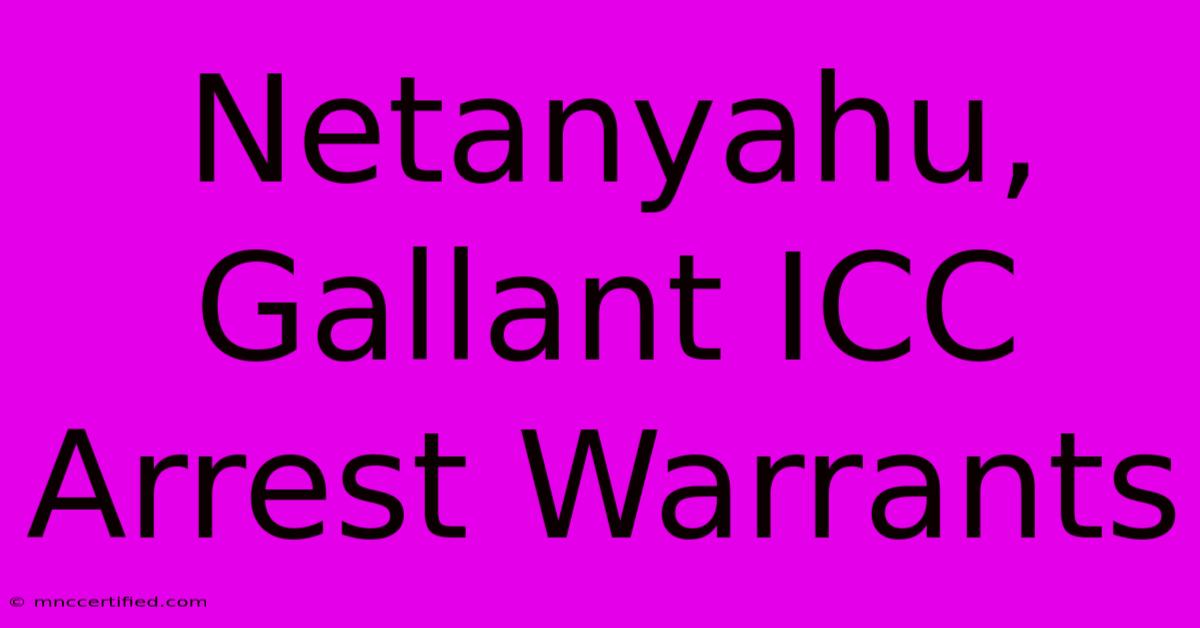Netanyahu, Gallant ICC Arrest Warrants

Table of Contents
Netanyahu, Gallant, and the ICC Arrest Warrants: Unpacking the International Implications
The recent issuance of arrest warrants by the International Criminal Court (ICC) for individuals involved in Israeli actions in the Palestinian Territories has ignited a firestorm of debate. This article delves into the complexities surrounding the warrants, focusing specifically on the implications for Prime Minister Benjamin Netanyahu and Defense Minister Yoav Gallant. We will explore the legal arguments, political ramifications, and potential international repercussions.
Understanding the ICC's Jurisdiction and the Issued Warrants
The ICC's jurisdiction is a key point of contention. The court's authority stems from the Rome Statute, which Israel is not a signatory to. However, the ICC asserts jurisdiction based on the principle of territoriality, arguing that the alleged crimes occurred within the territory of a State Party (Palestine). This jurisdictional claim is vehemently disputed by Israel, which considers the ICC's actions as illegitimate and biased.
The warrants themselves allege war crimes and crimes against humanity, targeting individuals within the Israeli government and military for their alleged roles in the Israeli-Palestinian conflict. While the specific allegations remain under investigation, the warrants themselves represent a significant escalation in the international legal battle surrounding the conflict.
The Focus on Netanyahu and Gallant
While the warrants encompass a wider range of individuals, the inclusion of Prime Minister Netanyahu and Defense Minister Gallant carries immense political weight. Their roles at the helm of Israeli governance place them at the center of decisions related to military operations in the occupied territories. The ICC's allegations suggest a direct link between their actions and potential war crimes. This raises questions about accountability and the potential for international legal challenges to high-ranking Israeli officials.
Political Fallout and International Relations
The issuance of these warrants has sent shockwaves through the international community. Israel has reacted with fierce condemnation, denouncing the ICC's actions as politically motivated and a threat to its sovereignty. The warrants have exacerbated existing tensions between Israel and its allies, particularly those within the United States, where support for Israel remains strong but discussions around the ICC’s legitimacy continue.
Potential Impacts:
- Strained International Relations: The warrants have the potential to further strain Israel's relationships with countries that recognize the ICC's jurisdiction. Diplomatic efforts to navigate this crisis will be crucial.
- Domestic Political Implications: Within Israel, the warrants could solidify support for Netanyahu amongst his base, while also potentially fueling internal divisions on how to respond to the ICC’s actions.
- Legal Challenges and Resistance: Israel is likely to continue resisting the ICC's jurisdiction, potentially challenging the warrants in international legal forums and employing other measures to counter the court's authority.
The Path Forward: Legal and Diplomatic Strategies
The situation remains highly volatile, with various legal and diplomatic strategies being considered by all parties involved. Both Israel and its allies will likely seek to mitigate the impact of the warrants through a combination of:
- Legal Challenges: Pursuing legal avenues to contest the jurisdiction of the ICC and challenge the validity of the arrest warrants.
- Diplomatic Engagement: Engaging in diplomatic efforts to secure support from countries that share Israel’s perspective on the ICC’s authority.
- Public Relations Campaigns: Shaping public opinion both domestically and internationally regarding the legitimacy of the warrants and the Israeli government's actions.
Conclusion: An Uncertain Future
The ICC arrest warrants for Netanyahu, Gallant, and others represent a significant turning point in the long-standing Israeli-Palestinian conflict. The ensuing legal and diplomatic battles will determine the future trajectory of this situation, with significant implications for international law, international relations, and the ongoing conflict itself. The coming months and years will likely witness intense legal maneuvering and significant diplomatic efforts to manage this crisis and its repercussions. The warrants highlight the complex interplay between international law, national sovereignty, and the pursuit of justice in the context of deeply entrenched conflicts.

Thank you for visiting our website wich cover about Netanyahu, Gallant ICC Arrest Warrants. We hope the information provided has been useful to you. Feel free to contact us if you have any questions or need further assistance. See you next time and dont miss to bookmark.
Featured Posts
-
Richard Coles Net Worth Revealed
Nov 22, 2024
-
Weekend Forecast Storm Bert Hits Northern Ireland
Nov 22, 2024
-
Rooneys Post I M A Celeb Appearance Fatherly Focus
Nov 22, 2024
-
Taoiseachs Tribute To Ken Reid
Nov 22, 2024
-
Joint Powers Authority Insurance
Nov 22, 2024